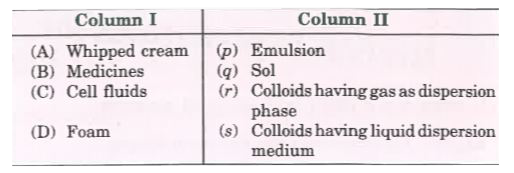Curd belongs to the type of colloid
gel
sol
emulsion
solid foam
The correct Answer is:A
Step by step video, text & image solution for Curd belongs to the type of colloid by Chemistry experts to help you in doubts & scoring excellent marks in Class 11 exams.
Topper's Solved these Questions
- BOOK - OP TANDONCHAPTER - THE COLLOIDAL STATEEXERCISE - step-1 Objective25videos
THE COLLOIDAL STATE
- BOOK - OP TANDONCHAPTER - THE COLLOIDAL STATEEXERCISE - Step -2 Objective10videos
THE COLLOIDAL STATE
- BOOK - OP TANDONCHAPTER - THE COLLOIDAL STATEEXERCISE - Self Assessment21videos
THE COLLOIDAL STATE
- BOOK - OP TANDONCHAPTER - STATES OF MATTER (SOLID STATE)EXERCISE - SELF ASSESSMENT Section VI3videos
STATES OF MATTER (SOLID STATE)
- BOOK - OP TANDONCHAPTER - VOLUMETRIC ANALYSISEXERCISE - Section-V3videos
VOLUMETRIC ANALYSIS
Similar Questions
Knowledge Check
- Question 1 - Select One
Sol is a type of colloid in which :
Asolid is dispeersed in liquidBliquid is dispersed in solidCgas is dispersed in liquidDsolid is dispersed in solid
What is the difference between multimolecular and macromolecular colloids ? Give one example of each type. How are associated colloids different from these two types of colloids ?
View SolutionWhat is the difference between multimolecular and macromolecular colloids ? Give one example of each How are associated colloids different from these two types of colloids ?
View SolutionWhat is the difference between multimolecular and macromolecular collids ? Give one example of each . How are associated colloids different from these two types of colloids ?
View SolutionWhat is the difference between multimolecular and macromolecular colloids? Give one example of each. How are associated colloids different from these two types of colloids ?
View SolutionNaphthalene belongs to which types of crystalline solids ?
View SolutionWhat is the difference between multimolecular and macromolecular collids ? Give one example of each . How are associated colloids different from these two types of colloids ?
View SolutionWhat is the difference between multimolecular and macromolecular colloids ? Give one example of each type. How are associated colloids different from these two types of colloids?
View Solution


